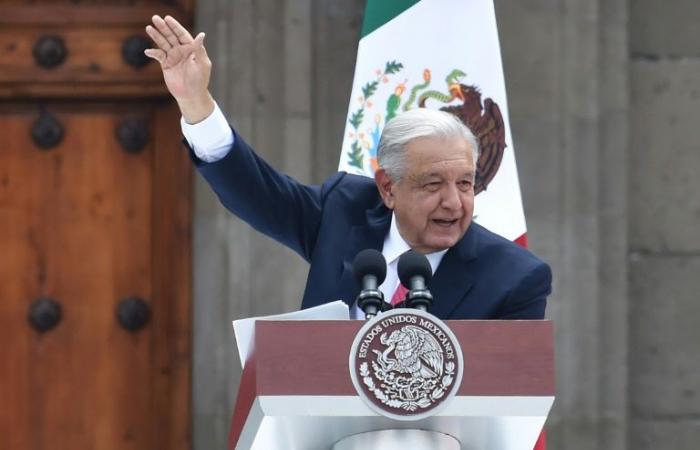Outgoing Mexican President Andres Manuel Lopez Obrador signed into law on Sunday, a national holiday, the controversial and unique law in the world on the election of all judges by “popular vote”, which worries the United States, investors and the judiciary.
“I will sign the decree for the publication of the reform of the Constitution with the objective of improving the judiciary,” declared in a video posted in the afternoon the nationalist left-wing president who ends his single six-year term with a record popularity of almost 70%.
At the end of the recording, he signs the decree with at his side the future president Claudia Sheinbaum, who will take power on October 1 after winning the single-round presidential election on June 2 with nearly 60% of the vote.
Both are leading figures in the National Regeneration Movement (Morena), which also has a two-thirds majority in the Congress of Deputies and is close to one vote in the Senate, which allowed the rapid adoption of the constitutional reform.
In the video published on his X account, AMLO justified the overhaul of the judiciary, which according to Washington represents a “risk” for Mexican democracy and a “threat” to the bilateral trade relationship.
“We need justice to reach everyone, for there to be no corruption in the judiciary, for judges, magistrates, ministers (members of the Supreme Court, editor’s note) to apply to the letter the principle that nothing is outside the law, and no one is above the law,” he said.
The outgoing president called for “a genuine rule of law” when he signed the decree on the national Independence Day.
– “Aspiring dictator” –
In the evening, the president will deliver the final “cry” of his term to the crowd gathered at the foot of the National Palace on the Zocalo – the largest square in Latin America – celebrating the start of the struggle for independence in 1810.
With the reform, Mexico will become the first country in the world to elect all of its judges by popular vote, including those of the Supreme Court, as well as some magistrates.
Nearly 7,000 judicial officials – including around 1,600 federal judges – will be elected in 2025 and 2027.
The judicial reform also reduces the number of Supreme Court judges from eleven to nine, while their terms of office are reduced from 15 to 12 years.
On the president’s account, its promulgation has again provoked sharp reactions from the “Amlovers” (nickname of the president’s supporters) and his adversaries.
“Shame on the president who is a dictator,” commented Carolina Beauregard, who presents herself as a “Catholic” and a member of the National Action Party (PAN, a right-wing liberal-conservative opposition).
“The reform of the judiciary is one of the most important changes in our Constitution” that allows to destroy “the refuge of many corrupt conservatives”, writes Jimenita (@Jime2002), who presents herself as an “Obradorista”.
Opponents of the reform stormed the chamber during the debate in the Senate on Tuesday to block its approval. The session continued in the former seat of the Senate.
The reform is worrying business circles, at a time when the Mexican economy is running out of steam (growth revised downwards for 2024 from 2.4 to 1.5%, stock market decline of 2.8% in August, weakening of the peso against the dollar).
The reform “will threaten the historic trade relationship we have built, which is based on investor confidence in Mexico’s legal framework,” worried the United States ambassador to Mexico, Ken Salzar, a trusted man of US President Joe Biden, a former member of the US Senate and the Obama administration.
In 2023, Mexico became the United States’ largest trading partner, ahead of China.
The world’s twelfth largest economy, Mexico is also plagued by the violence of organized crime (drug trafficking, migrants, extortion, etc.).
In a country that records some 30,000 homicides per year, the current justice system suffers from almost total inefficiency, according to the NGO Impunité Zéro: “for 100 crimes, only 6.4 are the subject of a complaint, of which 14% are cleared up. This means that the probability of solving a crime committed in our country is 0.9%.”
dr-jla-st/lpa






